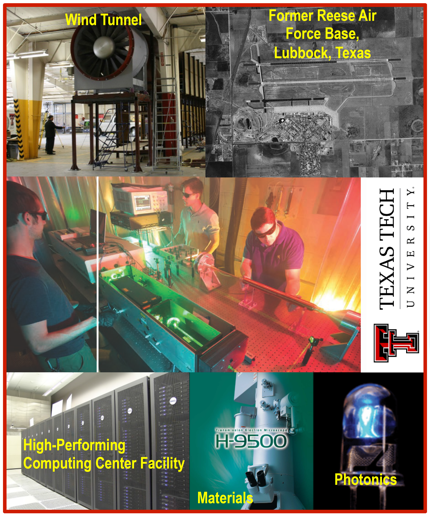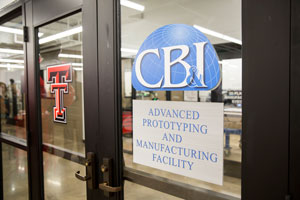Facilities

IMMS research efforts utilize and leverage numerous laboratories that are available at Texas Tech University. Highlights of relevant TTU facility capabilities include:
Computational Mechanics Laboratory (CML): CML develops numerical algorithms for the simulation of mechanical systems and their application to the analysis of different engineering problems;
Materials Characterization Center (MCC): MCC provides a wide range of needed equipment and apparatus for the materials studies including synthesis, analytical characterization, experimental, and application testing;
Data-Intensive Scalable Computing Laboratory (DISCL): DISCL provides parallel and distributed computing, high-performance computing, cloud computing, computer architectures, and systems software with a focus on building scalable computing systems for data-intensive applications in high-performance scientific computing/high-end enterprise computing;
Interactive Visualization Data Laboratory
Twin System Integration Laboratory: Science for Sustainment White Paper
Signal Processing Laboratory (SPL): SPL provides capabilities for time-series analysis, in time domain and frequency domain, and signal processing techniques such as statistical data analysis; simulation of random phenomena; data fitting and filtering; and application of the techniques to real data.
 Advanced Prototyping and Manufacturing Facility: The 8,400-square-foot facility accommodates both traditional and new digital rapid
manufacturing equipment that provide students the experience needed to handle new
and innovative technologies upon graduation. These technologies incorporate the rapid
transfer of science and technology into manufacturing. The facility focus on the three-dimensional
(3-D) printing of metals, plastics and other materials, with a stainless steel 3-D
printer serving as the centerpiece of the facility, making Texas Tech one of only
a few academic institutions with the capabilities of this type of printer. Students
also will gain experience in rapid digital data generation through the use of scanners
and other similar devices as well as digitally controlled material removal equipment
such as lathes and mills.
Advanced Prototyping and Manufacturing Facility: The 8,400-square-foot facility accommodates both traditional and new digital rapid
manufacturing equipment that provide students the experience needed to handle new
and innovative technologies upon graduation. These technologies incorporate the rapid
transfer of science and technology into manufacturing. The facility focus on the three-dimensional
(3-D) printing of metals, plastics and other materials, with a stainless steel 3-D
printer serving as the centerpiece of the facility, making Texas Tech one of only
a few academic institutions with the capabilities of this type of printer. Students
also will gain experience in rapid digital data generation through the use of scanners
and other similar devices as well as digitally controlled material removal equipment
such as lathes and mills.
IMMS Test and Evaluation Capabilities: In addition to exploratory and applied research efforts, IMMS is also establishing test and evaluation (T&E) capabilities at the Reese Technology Center to address the United States Department of Defense (U.S. DoD) Third Offset Strategy initiative. The plan is to support the basic and applied research efforts, as well as the T&E and development of futuristic autonomous technologies for the U.S. Armed Forces to conduct expeditionary missions in a complex world.
One of envisioned key capabilities is the unique integrated computation, modeling, test and evaluation with built-in data analytics fabrics in virtual environment. This capability is created to provide an effective real-time analysis and mining of the massive amounts of data (Big Data) being autonomously collected and generated. Particularly, TTU IMMS is able to create, test, evaluate, and demonstrate smart and autonomous physical systems (SAPS), which have the following abilities:
Aware of their own remaining capabilities and health condition, assess demanded tasks versus available capabilities, self reconfigure or adapt to a particular health condition or situation, capable of self operating autonomously over extended periods of time with minimum or no human assistance or supervision.
- Perform multiple tasks to include: (1) providing direct feedbacks, (2) conducting self learning, (3) acquiring structured or unstructured information or data, and (4) be able to ingest; digest; extract; prepare; and transform them into a critical and essential asset.
- Self monitor their own behaviors and self-diagnose their own states in order to quantify, forecast, and prognosticate their future state and system remaining useful capability or longevity.
- Self inform of what; when; and why it has happened, perform quantitative; qualitative; and introspectively meta-reasoning about their limitations; future decisions; and projected outcomes, and optimize insights into the past and future.
Institute for Materials, Manufacturing, and Sustainment
-
Address
Texas Tech University, 2500 Broadway, Lubbock, TX 79409 -
Phone
806.742.2011 -
Email
webmaster@ttu.edu
